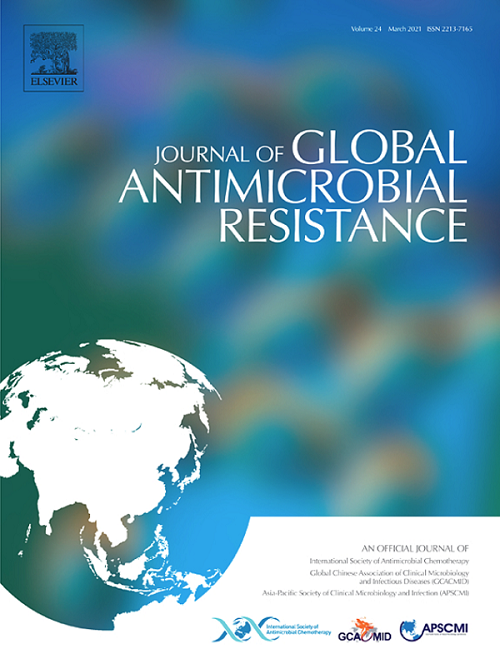In vitro activity of sulopenem and comparator agents against US Enterobacterales clinical isolates collected during the SENTRY antimicrobial surveillance program in 2023
IF 3.2
3区 医学
Q2 INFECTIOUS DISEASES
引用次数: 0
Abstract
Objective
Sulopenem is a thiopenem antibacterial with an oral and parenteral formulation. Sulopenem etzadroxil/probenecid, the oral formulation, was recently approved by the United States Food and Drug Administration for the treatment of women with uncomplicated urinary tract infection (UTI). This study evaluated the in vitro activity of sulopenem and comparator agents against contemporary Enterobacterales clinical isolates predominantly from patients with UTIs.
Methods
A contemporary collection of 1086 community- and nosocomial-acquired Enterobacterales isolates was assembled from US medical centres. Isolates were susceptibility tested using the Clinical and Laboratory Standards Institute broth microdilution reference method.
Results
Sulopenem demonstrated potent in vitro antimicrobial activity (MIC50/90, 0.03/0.25 mg/L) against Enterobacterales isolates regardless of infection type, inhibiting 98.0% of isolates at ≤0.5 mg/L. This activity was conserved against resistant phenotypes, including extended-spectrum β-lactamase (ESBL)-phenotype Escherichia coli (MIC50/90, 0.03/0.06 mg/L) and ESBL-phenotype Klebsiella pneumoniae (MIC50/90, 0.06/0.12 mg/L). As would be expected, cross-resistance was found with imipenem and meropenem to a lesser extent. Sulopenem maintained activity against ciprofloxacin-, nitrofurantoin-, and trimethoprim/sulfamethoxazole-non-susceptible subsets, including urinary isolates from patients in the community (MIC50/90, 0.03–0.12/0.12–0.5 mg/L). Sulopenem also maintained activity against community-acquired ESBL-producing Enterobacterales urinary isolates non-susceptible to two or more oral antimicrobial agents commonly used to treat UTIs.
Conclusions
The potent in vitro activity of sulopenem against this large collection of contemporary Enterobacterales clinical isolates from multiple infection types supports its use in the treatment of uncomplicated UTI, as well as its further clinical evaluation in the treatment of other common bacterial infections demonstrating resistant phenotypes.
2023年SENTRY抗菌监测项目收集的美国肠杆菌临床分离株的体外活性研究
目的:苏洛培南是一种口服和非注射制剂的硫培南抗菌药物。口服制剂索洛培南依扎诺西/probenecid最近被美国食品和药物管理局批准用于治疗无并发症的女性尿路感染。本研究评估了苏洛培南和比较剂对主要来自尿路感染患者的当代肠杆菌临床分离株的体外活性。方法:收集来自美国医疗中心的1,086株社区和医院获得性肠杆菌分离株。采用CLSI肉汤微量稀释参比法对分离菌株进行药敏试验。结果:苏洛培南对不同感染类型的肠杆菌均表现出较强的体外抗菌活性(MIC50/90, 0.03/0.25 mg/L),在≤0.5 mg/L浓度下,对98.0%的分离菌均有抑制作用。该活性对耐药表型包括esbl -表型大肠杆菌(MIC50/90, 0.03/0.06 mg/L)和esbl -表型肺炎克雷伯菌(MIC50/90, 0.06/0.12 mg/L)均具有保守性。正如预期的那样,亚胺培南和美罗培南的交叉耐药程度较轻。舒洛培南对环丙沙星、呋喃妥英和甲氧苄啶/磺胺甲恶唑非敏感亚群(包括社区患者尿中分离物)保持活性(MIC50/90, 0.03-0.12/0.12-0.5 mg/L)。苏洛培南还对社区获得性产esbls尿分离肠杆菌保持活性,该肠杆菌对两种或两种以上用于治疗尿路感染的口服抗菌药物不敏感。结论:苏洛培南对来自多种感染类型的大量当代肠杆菌临床分离株的有效体外活性支持其用于治疗非复杂性尿路感染,以及其在治疗其他常见细菌感染方面的进一步临床评估。
本文章由计算机程序翻译,如有差异,请以英文原文为准。
求助全文
约1分钟内获得全文
求助全文
来源期刊

Journal of global antimicrobial resistance
INFECTIOUS DISEASES-PHARMACOLOGY & PHARMACY
CiteScore
8.70
自引率
2.20%
发文量
285
审稿时长
34 weeks
期刊介绍:
The Journal of Global Antimicrobial Resistance (JGAR) is a quarterly online journal run by an international Editorial Board that focuses on the global spread of antibiotic-resistant microbes.
JGAR is a dedicated journal for all professionals working in research, health care, the environment and animal infection control, aiming to track the resistance threat worldwide and provides a single voice devoted to antimicrobial resistance (AMR).
Featuring peer-reviewed and up to date research articles, reviews, short notes and hot topics JGAR covers the key topics related to antibacterial, antiviral, antifungal and antiparasitic resistance.
 求助内容:
求助内容: 应助结果提醒方式:
应助结果提醒方式:


